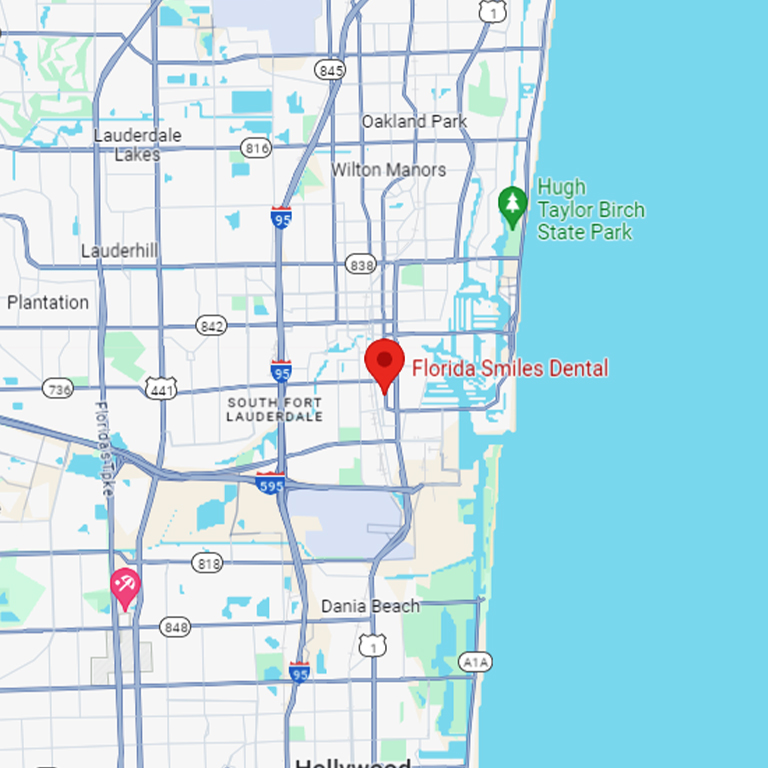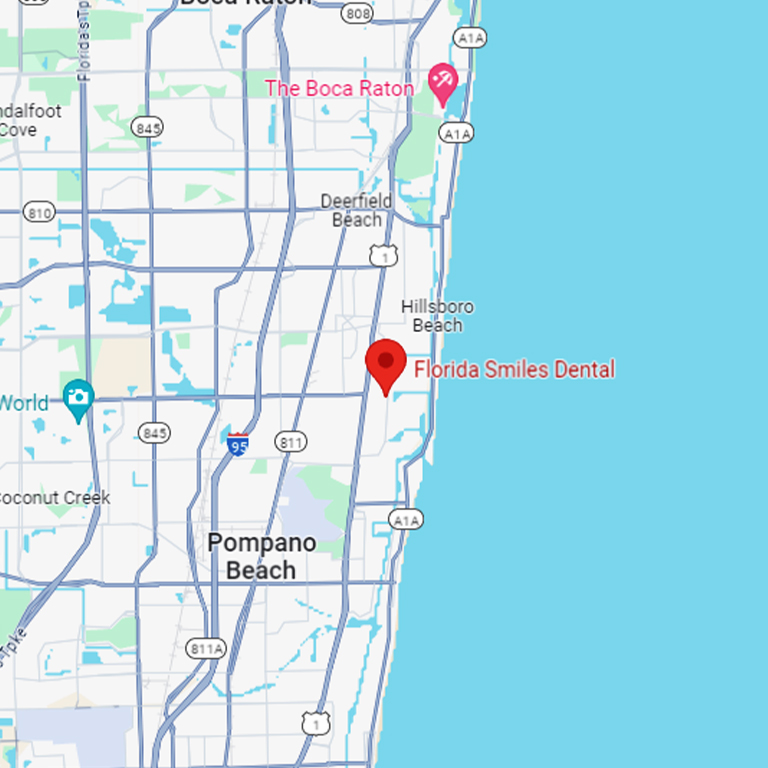Oral Surgery

Oral surgery is any dental operation performed on your jaw, gums, teeth, or surrounding facial and oral structures.
Oral surgery in Fort Lauderdale and Lighthouse Point is a dental specialty that encompasses a variety of procedures that fall more along the lines of surgery. They require a diagnosis and a treatment plan for the disease, injury, or other defect.
Oral surgery could be needed for functional needs or aesthetic reasons.
The Most Common Reasons Oral Surgery Is Needed
Your dentist will do everything possible to help you avoid oral surgery. However, sometimes, the need for oral surgery is inevitable.
If you have any of the following, your dentist might recommend oral surgery.
- Impacted or missing teeth
- Surgical tooth extraction (not including simple extractions)
- Severe (or extensive) tooth decay
- Jawbone loss
- Dental bone grafts
- Cleft lip and palate repair
- Oral cancer or noncancerous lumps or bumps
- Gum disease
- Sleep apnea
- Extreme overbites or underbites
- Temporomandibular joint disorders
And even dental implants require minor oral surgery.
The Different Types of Oral Surgery Explained
The following are the most common types of oral surgery.
Dental Implants
Dental implants in Fort Lauderdale, FL, are extremely popular. They are reliable and are the best long-lasting tooth replacement option available. Minor dental surgery is required to implant small titanium posts/screws into your jawbone. Bone will then fuse to those posts. Your new permanent dental implants can then be completed.
Wisdom Tooth Removal
Wisdom teeth can become impacted. Your wisdom teeth come in much later in life than your adult teeth. Wisdom teeth only come in (erupt) once you reach the ages between 17 and 25. And therein lies the problem.
Since your other adult teeth come in long before your wisdom teeth, they commonly create problems for your existing teeth. So, removing your wisdom teeth can prevent that from happening. Or correct it if it does. Your dentist will examine and x-ray your teeth and make a recommendation based on the findings.
Non-Simple Tooth Extractions
If you have severe or extensive tooth decay, you will need more than a simple tooth extraction (which doesn’t require oral surgery).
When you have severe or extensive tooth decay, gum disease, wisdom tooth issues, or dental trauma, you are probably going to need to have your tooth/teeth surgically removed.
In addition, if you need dentures or plan on getting dental implants, this is another case when your teeth must be surgically removed in preparation for those dental procedures.
Frenectomy
Some people are born with a malformed frenulum. The lingual frenulum is the thin membrane that connects your tongue to your mouth. The labial frenula is where the tops and bottoms of your gums meet with your lips. Sometimes, these frenula are formed incorrectly.
An incorrectly formed frenulum can affect speech, make brushing more difficult, produce gaps between teeth, cause trouble chewing and breathing, and even be painful. And, if not corrected, a malformed frenulum could eventually result in gum disease. Your dentist in Fort Lauderdale, FL, can perform what’s called a frenectomy to fix this issue.
Periodontal Surgery
Periodontitis is gum disease. If your gum disease is severe enough, your dentist might need to perform periodontal surgery. This surgery could involve cutting through your gums to access and clean your teeth roots. Or it might require a gum graft.
Sleep Apnea Surgery
Obstructive sleep apnea (OSA) is when the tissues in your throat move and block your airways while sleeping. Most sleep apnea can be treated with oral appliance therapy or other non-surgical method. However, if it can’t, your case might require oral surgery to correct it.
The Oral Surgery Process
Your dentist will examine your teeth and gums, then take X-rays and/or scans. X-rays and scans give the dentist a clearer view of your oral health needs (tooth roots, nerves, jawbone, etc.).
Oral surgery is frequently an outpatient surgery. It is performed in the dentist’s office. Your dentist will likely offer you various sedation options (oral medications, IV sedation, nitrous oxide) to make you comfortable.
How long it takes to complete your oral surgery depends on various factors, including what type of oral surgery you have. It will also depend on which type of sedation you choose. So, if you are just having a tooth extracted, your surgery might only take 30 minutes or so. However, if your surgery is for a corrective issue, it could take a few hours.
After the dentist has completed your oral surgery, they will give you some post-operative instructions to follow. Closely following these instructions will help you avoid infection, excessive bleeding, and other complications.
Oral Surgery Recovery Time
Just like anything else, how long it takes you to recover from your oral surgery procedure will vary from person to person. However, on average, it takes most people about a week or so before getting back to a normal oral routine. The more extensive the surgery, the longer it will take to recover. But don’t worry; your dentist will prescribe you the appropriate medications (if needed) to help you feel comfortable.
In most cases, you should be able to return to work or school within three days unless you had a corrective type of surgery, in which case you will require a longer recovery period. Your dentist will give you a more specific timeline based on your individual situation.
Eating after Oral Surgery
In order to heal properly, your dentist will ask you to avoid crunchy, hard, and sticky foods. You will need to follow a soft foods diet for a while. This would include foods such as soup, eggs, yogurt, pasta, fish, pudding, puréed fruits and vegetables, etc. And, if you want to help ease some of the surgical area discomforts, you can enjoy some cold foods like ice cream, milkshakes, popsicles, etc., without having to feel guilty.
The Potential Risks of Having Oral Surgery
As with any surgery, there are some risks involved. Here are some of the possible post-operative risks you could experience. That’s why following your dentist’s post-op instructions is so important.
- Dry socket (this happens when the blood clotting process is disturbed, which is common when you have had a tooth extracted)
- Infection
- Numbness
- Damage or injury to the surrounding teeth
- Fragments from your tooth’s roots
- Sinus problems
Contact your dentist immediately if you develop these or any other side effects from your oral surgery, especially if those side effects don’t go away or are accompanied by a fever of 100° or higher. In addition, if you notice drainage at the surgical site, this could indicate that you are developing an infection. In this case, contact your dentist immediately!
How Do You Know When to Contact a Dentist?
If you are experiencing any oral pain, such as tooth, jaw, or gum pain, that could be a sign you are developing an oral health issue. So, the sooner you see the dentist, the sooner you can be diagnosed and treated. And that will save you loads of money in the long run!
What’s Next?
Please contact Florida Smiles Dental today to schedule an exam. We have two locations to serve you: Fort Lauderdale and Lighthouse Point, FL. We would love the chance to turn your dental frowns upside down!





